| Srl | Item |
| 1 |
ID:
098126


|
|
|
| 2 |
ID:
103971
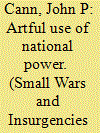

|
|
|
|
|
| Publication |
2011.
|
| Summary/Abstract |
In its colony of Angola, Portugal during its colonial wars (1961-1974) was able to exploit the economic dependence and divided population loyalties of its hostile neighbours the Congo and Zambia as well as the cleavages within the nationalist movements to prevent a crippling insurgency. The rulers of both countries were largely dependent on Angola for trade, and were eager to have the side effects of the robust Angolan economy with its 11% annual growth brush off on their own moribund ones. While relationships were never comfortable, the sponsors of revolution were forced to reign in their 'freedom fighters' in order to maintain the functioning of their export-dependent economies. Portuguese leadership also played a vital role, as it was able to bring together diverse elements of national power in a concerted policy for dealing with these enemies, whether they were insurgents or their sanctuary countries. This policy of leveraging national power and playing on the vulnerabilities of its opponents worked well during its war in Angola and still holds valuable lessons for countries that find themselves in similar circumstances.
|
|
|
|
|
|
|
|
|
|
|
|
|
|
|
|
| 3 |
ID:
167066
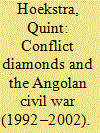

|
|
|
|
|
| Summary/Abstract |
In the early 1990s several rebel groups turned to natural resource extraction to pay for war. A key form of this is rebel diamond production, commonly referred to as conflict diamonds, which is widely perceived as being highly beneficial to insurgent organisations. Yet in the Angolan Civil War (1992–2002), the use of conflict diamonds by the National Union for the Total Independence of Angola (UNITA) resulted in a decisive insurgent defeat. How can this outcome be explained? Offering a nuanced understanding of how conflict diamonds affect civil war, this article shows that although diamonds generated considerable revenue for UNITA, they were not an effective method for them to take on the Angolan government. This was for two reasons: internally, the rebels greatly struggled to convert their diamond proceeds into sufficient goods and services; and externally, it left the group highly vulnerable to international countermeasures in the form of United Nations Security Council sanctions. Natural resource extraction may therefore not be as useful to rebel groups as is frequently believed.
|
|
|
|
|
|
|
|
|
|
|
|
|
|
|
|
| 4 |
ID:
164152
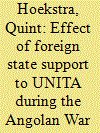

|
|
|
|
|
| Summary/Abstract |
State support for foreign rebel groups has become more salient, yet it remains unclear how this affects armed conflict. This paper therefore analyses the effect of foreign government assistance and does so in the typical case of the Angolan War (1975–1991). It argues that South African and United States support greatly helped the National Union for the Total Independence of Angola (UNITA) wage a large and sustained insurgency campaign but was ultimately insufficient to overthrow the People’s Movement for the Liberation of Angola (MPLA) government because it enabled the incumbent government to obtain similar foreign assistance and because the level of aid awarded to UNITA fluctuated strongly, preventing it from engaging in meaningful long-term planning.
|
|
|
|
|
|
|
|
|
|
|
|
|
|
|
|
| 5 |
ID:
090446
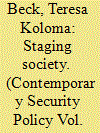

|
|
|
|
|
| Publication |
2009.
|
| Summary/Abstract |
Staging Society
Loyalty
Angolan UNITA
UNITA
|
|
|
|
|
|
|
|
|
|
|
|
|
|
|
|
| 6 |
ID:
152026
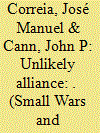

|
|
|
|
|
| Summary/Abstract |
The war that Portugal was obliged to fight in Africa began in 1961 and immediately stretched the resources of its armed forces. Nowhere was this thinness more apparent than in policing the vast territory of Angola. The east and southeast of Angola were particularly vulnerable, as the area was a vast, sparsely populated region characterised by enormous featureless plains or chanas covered in tall grass and broken by an extensive river system and mountainous forests. The only military solution to policing these immense spaces was aviation and specifically the helicopter that could carry troops into battle, protect them with a gunship and bring them home when the operation was concluded. The immediate problem for the Portuguese Air Force (Força Aérea Portuguesa or FAP) in Angola and elsewhere was a scarcity of helicopters. The solution was an alliance with South Africa, which had a strong inventory of Alouette IIIs, to help in policing the east. This move was likewise in the interest of South Africa, as its threat came from Zambia through south-eastern Angola. This article examines the strategic and tactical development of this unusual, cross-cultural alliance and the symbiotic relationship that resulted in destruction of the enemies of both in Angola.
|
|
|
|
|
|
|
|
|
|
|
|
|
|
|
|